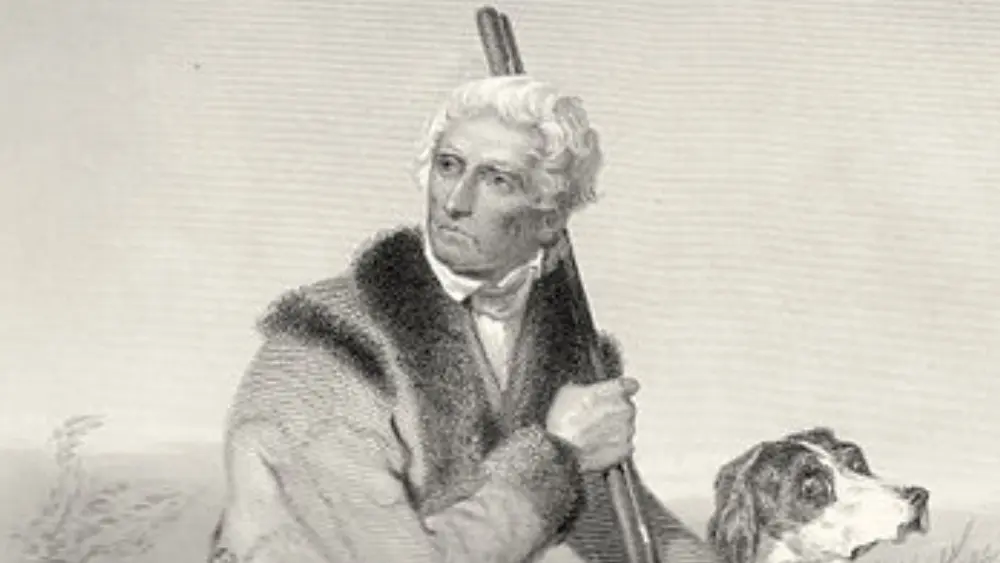Daniel Boone, a renowned American pioneer and frontiersman, is celebrated for his instrumental role in the exploration and settlement of Kentucky, as well as his establishment of the Wilderness Road, a vital trail that facilitated westward expansion in the United States. Born on November 2, 1734, in Pennsylvania, Boone’s life and adventures were marked by his indomitable spirit, his profound knowledge of the wilderness, and his contributions to the expansion of the American frontier.
Early Life and Frontier Experiences
A close connection with the forests and streams characterized his childhood, instilling in him a profound understanding of the land and its resources. Living in an environment where self-reliance was crucial, he learned to navigate through dense forests, track game, and survive the challenges of the rugged terrain. These formative years molded Boone into a resilient and resourceful individual, laying the foundation for his later remarkable frontier experiences.
As Boone ventured into the frontier, his profound understanding of the wilderness and his expertise in survival became pivotal in his interactions with Native American tribes and his explorations into uncharted territories. His early encounters with the dangers and beauty of the untamed frontier honed his skills as a trailblazer and provided him with an intimate knowledge of the land’s geography and inhabitants. His ability to adapt to the ever-changing and often perilous conditions of the frontier solidified his reputation as a legendary figure in American history, with his name becoming synonymous with the spirit of adventure and exploration in the early days of the American West.
Daniel Boone: Journey to Kentucky
Facing numerous challenges, including hostile encounters with Native American tribes and the treacherous nature of the uncharted wilderness, Boone’s determination and leadership were instrumental in guiding the group through the Appalachian Mountains and into the heart of Kentucky. His exceptional knowledge of the terrain and his ability to negotiate with various indigenous groups enabled the successful establishment of Boonesborough, a key settlement in the region.
Boone’s journey to Kentucky not only solidified his reputation as a skilled frontiersman but also played a crucial role in opening up the western frontier for further exploration and settlement. Despite the numerous hardships and dangers, his perseverance and strategic decision-making paved the way for the influx of more settlers into Kentucky, thereby contributing significantly to the expansion of the American frontier and the subsequent shaping of the nation’s history.
Establishment of Boonesborough
Despite the constant threat of Native American attacks and the challenges of building a settlement in a harsh and unfamiliar environment, Boone exhibited exceptional leadership and resilience in ensuring the security and sustainability of Boonesborough. His strategic placement of the settlement along the Kentucky River not only facilitated trade and communication but also demonstrated his foresight in recognizing the geographical significance of the location.
Boonesborough’s establishment not only served as a testament to Boone’s determination but also laid the groundwork for the subsequent growth and development of the Kentucky territory. Through his leadership and ingenuity, Boone set a precedent for the creation of stable communities in the wilderness, fostering a sense of stability and progress in a region that was previously considered inaccessible and hostile. The enduring legacy of Boonesborough continues to symbolize the spirit of resilience and fortitude that characterized the early pioneers of the American frontier.
Daniel Boone: The Wilderness Road
Boone’s extensive knowledge of the terrain and his experience as a frontiersman were crucial in guiding the construction of the Wilderness Road, which ultimately became a vital thoroughfare for countless pioneers seeking new opportunities in the American frontier. Despite the formidable challenges posed by the rugged landscape and the persistent threat of attacks from Native American tribes, Boone’s unwavering dedication and strategic planning ensured the successful development of this critical passage, significantly reducing the risks associated with westward migration.
The establishment of the Wilderness Road not only fostered increased settlement and trade in the region but also paved the way for the eventual integration of Kentucky and other western territories into the fabric of the United States. Boone’s visionary leadership and perseverance in carving out this path reshaped the landscape of the frontier, ultimately contributing to the expansion and development of the young nation. His enduring legacy as a trailblazer on the Wilderness Road remains a testament to his significant impact on American history and the spirit of exploration that defined the nation’s early years.
Encounters with Native Americans
His experiences gave him a unique perspective on the cultural intricacies and challenges inherent in the coexistence between the expanding European settlements and the native inhabitants of the land. While Boone faced significant dangers and hardships during his abductions, his eventual release and return to the settlements fostered a nuanced understanding of the diverse tribal dynamics and cultural practices within the Native American communities.
Boone’s ability to navigate these intricate relationships with respect and diplomacy was pivotal in mitigating potential conflicts and establishing a framework for peaceful cohabitation on the frontier. His insights into the values and customs of the Native American tribes not only contributed to his reputation as an adept negotiator but also highlighted the importance of mutual understanding and cooperation in the complex tapestry of early American history.
Daniel Boone: Impact on Westward Expansion
Boone’s pioneering spirit and relentless pursuit of new frontiers inspired countless individuals to follow in his footsteps, leading to a significant influx of settlers into Kentucky and the broader western territories. His emphasis on the importance of creating viable communities in the wilderness laid the groundwork for the eventual establishment of towns and cities that would form the backbone of the expanding American nation.
Furthermore, Boone’s role in fostering positive relationships with Native American tribes, despite the complexities of such interactions, set a precedent for peaceful coexistence and cooperation in the midst of rapid westward expansion. His diplomatic skills and understanding of the diverse cultural landscape of the frontier served as a model for future pioneers, highlighting the significance of mutual respect and collaboration in developing a cohesive and inclusive society. Daniel Boone’s enduring legacy as a trailblazer and his significant impact on westward expansion remain integral to the narrative of American history, underscoring the spirit of exploration and resilience that defined the early stages of the nation’s growth.
Representation in American Folklore and Popular Culture
Throughout the years, Boone’s iconic image as a rugged frontiersman navigating the uncharted wilderness with unparalleled skill and courage has captured the imagination of countless generations, contributing to the creation of a rich and enduring mythos surrounding the early exploration of the American West. His portrayal as a symbol of perseverance and resilience has resonated deeply with audiences, cementing his place in the collective consciousness of the nation and inspiring a sense of adventure and exploration that continues to permeate American culture.
From ballads and folk songs to literary works and Hollywood productions, Daniel Boone’s character has been reimagined and romanticized, further solidifying his status as a quintessential American folk hero. Through various adaptations and reinterpretations, his pioneering spirit and contributions to the frontier have become ingrained in the cultural fabric of the United States, reflecting the enduring fascination with the untamed wilderness and the relentless pursuit of new horizons that define the American ethos.

Daniel Boone: Legacy of Exploration and Frontier Spirit
Boone’s unwavering commitment to pushing the boundaries of the known world and his relentless pursuit of new frontiers symbolize the resilience and determination that have come to define the American spirit. His remarkable feats in navigating the uncharted wilderness of the early American frontier serve as a testament to the indomitable human will and the capacity for individuals to triumph over seemingly insurmountable challenges.
Moreover, Boone’s legacy serves as a reminder of the importance of preserving and respecting the natural environment, fostering a deep appreciation for the wilderness and its intrinsic value. His profound connection to the land and understanding of its intricacies underscore the significance of responsible stewardship and the need to maintain a harmonious relationship with nature. Daniel Boone’s enduring legacy as a trailblazer and his unwavering dedication to exploration and preservation continue to resonate with contemporary society, emphasizing the timeless significance of the frontier spirit in shaping the American identity.











Good post!